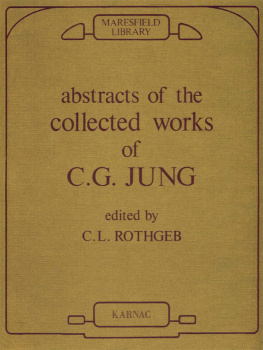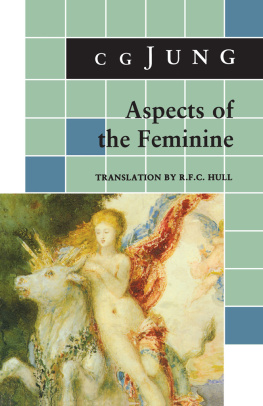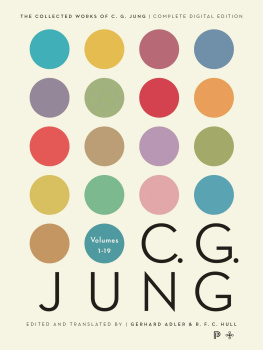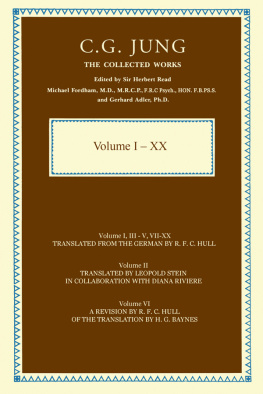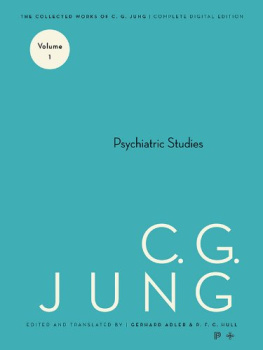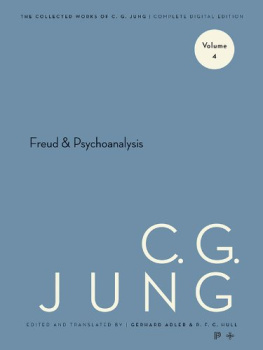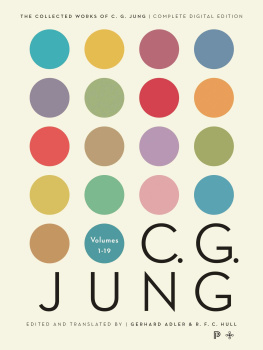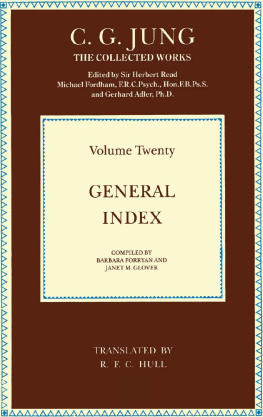Carrie L. Rothgeb - Abstracts of the Collected Works of C.G. Jung
Here you can read online Carrie L. Rothgeb - Abstracts of the Collected Works of C.G. Jung full text of the book (entire story) in english for free. Download pdf and epub, get meaning, cover and reviews about this ebook. year: 2012, publisher: Karnac Books, genre: Religion. Description of the work, (preface) as well as reviews are available. Best literature library LitArk.com created for fans of good reading and offers a wide selection of genres:
Romance novel
Science fiction
Adventure
Detective
Science
History
Home and family
Prose
Art
Politics
Computer
Non-fiction
Religion
Business
Children
Humor
Choose a favorite category and find really read worthwhile books. Enjoy immersion in the world of imagination, feel the emotions of the characters or learn something new for yourself, make an fascinating discovery.
- Book:Abstracts of the Collected Works of C.G. Jung
- Author:
- Publisher:Karnac Books
- Genre:
- Year:2012
- Rating:3 / 5
- Favourites:Add to favourites
- Your mark:
- 60
- 1
- 2
- 3
- 4
- 5
Abstracts of the Collected Works of C.G. Jung: summary, description and annotation
We offer to read an annotation, description, summary or preface (depends on what the author of the book "Abstracts of the Collected Works of C.G. Jung" wrote himself). If you haven't found the necessary information about the book — write in the comments, we will try to find it.
Abstracts of the Collected Works of C.G. Jung — read online for free the complete book (whole text) full work
Below is the text of the book, divided by pages. System saving the place of the last page read, allows you to conveniently read the book "Abstracts of the Collected Works of C.G. Jung" online for free, without having to search again every time where you left off. Put a bookmark, and you can go to the page where you finished reading at any time.
Font size:
Interval:
Bookmark:
This printing by
Karnac Books Ltd.
118 Finchley Road, London NW3
Introduction copyright 1992 by Andrew Samuels
British Library Cataloguing In Publication Data.
A catalogue record for this book is available from the British Library.
ISBN 978 1 85575 035 7
Printed in Great Britain by BPCC Wheatons Ltd, Exeter
Andrew Samuels
When Cesare Sacerdotl, Managing Director of Karnac Books, asked me to write an Introduction to the re-publication of the Abstracts of the Collected Works ojC. G. Jung, I must confess that my heart sank. As a good Jungian, I experienced a feeling of dismay, almost of revulsion, at the very idea of there being Abstracts of Jungs texts, fearing that compression would ruin the subtlety of Jungs writing and that a spurious clarity would render his thought meaningless. I have to say that I muttered, Let them eat cake meaning that people wanting to know Jungs ideas should read Jungs books. At the same timeand this is also part of the self-critical heritage of being a Jungian analystI have been aware for many years of the enormous difficulties many people experience on reading Jung. The difficulties are with the voluptuousness of his style (at least as this comes over in the English translations of R. F. C. Hull), with his tendencies to generalize and to contradict himself, and with the unavoidable vagueness that attaches itself to the communication of concepts that often began life as personal experiences of Jungs, stemming from dreams, visions, and relationships.
I was surprised and relieved to find that these Abstracts really do work. I use work deliberately because Abstracts are nothing if not tools. (Of what trade they are the tools, I shall discuss shortly.) The abstracters have been given sufficient space for each summary to enable a degree of differentiated expression. In particular, it seems to me to be perfectly possible to use the Abstracts in conjunction with a reading of one section of a longer text of Jungs. The reader is therefore enabled to place a passage of Jungs that he or she may have been studying in its correct textual setting. I tested this proposition for myself by consulting the Abstracts to see, first, how well the abstract of the Two Essays on Analytical Psychology (Volume 7) had been done, and, second, to see whether, had I been studying the first part of The Relations between the Ego and the Unconscious, I would have found the abstract of the second part helpful. In my view, the abstract is accurate, and it is indeed possible to use the relevant part of the abstract to flesh out a reading of the full text of another part. Moreover, numerous rather arcane points have been noted by the abstracters; for example, In connection with the Two Essays the abstracters have realized the importance of the series of prefaces that Jung wrote to the various editions of his books.
Having praised and commended the overall level of the Abstracts, I want to do more with this short Introduction. The cultural, intellectual, and clinical locations of Jungs analytical psychology have changed so rapidly that a few lines on these phenomena are surely in order.
For many who are interested in depth psychology, Jung has often been regarded as a marginal and somewhat unreliable figure. His work has been castigated as mystical, characterized by an avoidance of the instinctual dimension, elitist to the point of being fascist, and, in general terms, as an Intellectual and clinical cul-de-sac. No doubt there are serious criticisms to be made of the corpus of analytical psychology. But, as must be the case with any field of endeavour, these criticisms do not come from neutral sources. The penumbra of the shattering break with Freud is still with us. Moreover, in a personalizing age, Jungs anti-semitic writings of the 1930s, and certain aspects of his clinical behaviour that strike the modern observer as unethical, have not helped his cause.
But, as I said, the situation is changing.
From the clinical standpoint, analytical psychology has not remained static since Jungs death in 1961.1 have chronicled post-Jungian productivity elsewhere (Samuels, 1985). Even those analysts who consider themselves members of the classical school, who try to work in ways congruent with Jungs own core philosophies, have evolved their clinical practice. Those analysts who are members of the developmental school have integrated clinical concepts from contemporary psychoanalysis to such a degree that a hybrid is often claimed to have come into being. There are now over 1500 Jungian analysts world-wide and, I would Judge, approximately the same number of practitioners whose appellation could be said to be Jungian analytical psychotherapist. This hugely expanding clinical project gives lie to any idea that analytical psychology is some kind of new-age phenomenon (which is not to deny the influence of Jungian thinking on new-age ideas, or on humanistic psychology).
Increasingly, the pioneering contributions to depth psychology of Jung and the post-Jungians are being recognized. In many respects, developments within psychoanalysis have been anticipated by analytical psychology, often by decades, even if the degree of detailed working out has sometimes not been present.
From academic and intellectual standpoints, a new field of Jungian Studies is beginning to open up. Central to this field is a historically based re-evaluation of the origins of Jungs ideas and practices and of the break with Freud. Literary and art criticism, often based (it must be said) on somewhat mechanistic and out-of-date applications of Jungian theory, are beginning to flourish. Anthropological, social, and political studies that tend to rest on Jungs intuitions about directions to explore rather than on his conclusions are also being developed. Jungs influence on religious studies has existed for a long time.
It seems inevitable that the Abstracts, necessary tools of the trade for students and perhaps even for scholars, would come into being. So it is a bit of a shock to discover the prescience of the National Institute of Mental Health, which first published this work in 1978. In fact, the Abstracts would have been issued earlier, had it not been for a delay caused by waiting for the publication of Volume 18 of the Collected Works. (For obvious reasons, the abstracts do not cover the supplementary volumes or the seminar volumes of the Collected Works, nor do they make use of the General Index. All of these were published later.) The Abstracts were not sold but were given free to those who requested them. About 10,000 copies were distributed by this method. The figure can be compared with the Freud Abstracts, also published by the NIMH, of which about 20,000 were distributed. The Abstracts were written by professional abstracters and then reviewed by a Jungian analyst.
It is undoubtedly significant that the Jung Abstracts followed the Freud Abstracts] The two great divisions of depth psychology exist in a competitive, complementary, mimetic love-hate relationship. Psychoanalytic Studies, as an academic discipline, is much more established than Jungian Studies, which is really Just getting of the ground. There are advantages to being a generation behind in that it might be possibleand I would stress the word mightfor analytical psychology to avoid the huge ravines that have tended to separate clinicians and the various kinds of academics within psychoanalysis.
If this separationsurely an unhealthy phenomenonis to be avoided in Jungian studies, then both the academic and the clinical camps will have to give ground. In psychological language, they will have to withdraw projections from the other grouptake back shadow elements that they would rather disown. Clinicians will have to become more aware of the theoretical and cultural assumptions that permeate everything they do. Although this will run counter to the idealization of analytical practice as an intuitive activity sensitive mostly to the individual psychology of the patient, it has to be admitted that clinical practice is a heavily theorized thing. Academics, in their turnand, in a way, following Jungwill have to question their privileging of Enlightenment-style rationalism and scientism.
Font size:
Interval:
Bookmark:
Similar books «Abstracts of the Collected Works of C.G. Jung»
Look at similar books to Abstracts of the Collected Works of C.G. Jung. We have selected literature similar in name and meaning in the hope of providing readers with more options to find new, interesting, not yet read works.
Discussion, reviews of the book Abstracts of the Collected Works of C.G. Jung and just readers' own opinions. Leave your comments, write what you think about the work, its meaning or the main characters. Specify what exactly you liked and what you didn't like, and why you think so.

